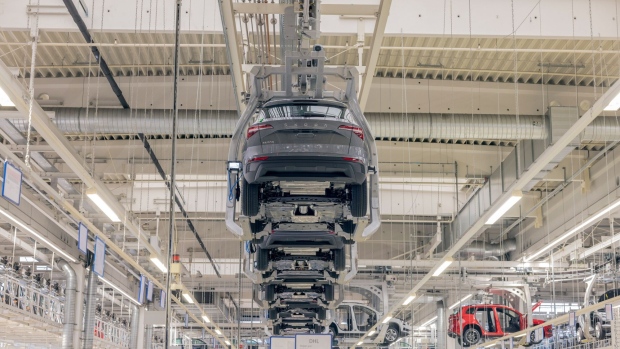Dec 5, 2023
VW Says Audit of Xinjiang Plant Found No Signs of Forced Labor
, Bloomberg News

(Bloomberg) -- Volkswagen AG said independent auditors found no signs of forced labor at its joint-venture plant in Xinjiang as the German automaker responds to concerns of human rights abuses in China’s far western region.
Berlin-based consultancy Löning audited the Urumqi facility, which is operated by a subsidiary of VW’s joint venture with state-backed SAIC Motor Corp., last month, the carmaker said late Tuesday. Shares rose as much as 3.1% early Wednesday, the biggest gain in more than a month.
“We will continue to take any indications of human rights violations very seriously in the future,” Manfred Döss, a VW management board member responsible for legal issues, said in a statement. “If there are any suspicions or indications, we will investigate them.”
VW has fielded uncomfortable questions about its presence in Xinjiang due to allegations by the US and others that China has pushed ethnic minorities including Muslim Uyghurs in the region into jobs programs as part of a sweeping effort to force them to assimilate into the Han-dominated society.
Read more: German Bosses Defy Scholz’s Plea to Shift Away From China
VW’s connection to the Xinjiang controversy has had consequences. VW was singled out last year by the US investment advisory firm MSCI Inc, which gave the company a “red flag” on ESG-related controversies involving listed companies. The downgrade forced several institutional investors to back away from the carmaker.
“The pressure from the capital market was effective,” said Ingo Speich, head of sustainability and corporate governance at Deka Investment. “The audit is a step in the right direction in terms of process and result. More transparency in the value chain would also be desirable.”
Investors currently precluded from owning VW shares on governance grounds “may now buy back at least some exposure,” Citigroup analyst Harald Hendrikse said in a note, provided the audit results satisfy MSCI. “We think this could reverse a significant proportion of the VW underperformance.”
The German automaker is under pressure to defend sales in China against home-grown manufacturers such as BYD Co. that are offering models geared to local tastes. VW’s sales in China, its biggest single market, have slid from a peak of 4.2 million cars in 2018 to 3.2 million vehicles last year.
Löning staff visited the plant, checked documents and conducted interviews with management and workers, the consultancy said Tuesday. It was accompanied by two lawyers from a Shenzhen-based law firm.
“The employees are paid above average and have little to do,” the consultancy’s founder Markus Löning said in a statement. “We could not find any indications or evidence of forced labor among the employees.”
Last year, the United Nation’s top human rights official found that China had committed “serious human rights abuses” in Xinjiang while the world body’s slavery expert determined that the forced-labor claims in the region were “reasonable.” China has repeatedly rejected criticisms of the work programs, calling allegations of forced labor lies and defending its policies as an effort to reduce poverty and unemployment.
Read more: Volkswagen Defends Xinjiang Plant Despite Uyghur Concerns
While the Urumqi plant has been in the spotlight, it doesn’t manufacture any vehicles. Its 197 workers — 24% of whom are minorities including Uyghurs — make final quality checks of already assembled vehicles that are then sent on to dealerships in the region. VW is contractually obligated to remain part of site operations until 2029.
The facility, which at its peak employed roughly 650 workers, doesn’t get any external parts and there are no plans to resume automaking there. The plant had previously produced the New Santana model.
(Updates with shares in third paragraph, investor comment in sixth.)
©2023 Bloomberg L.P.

